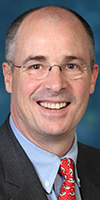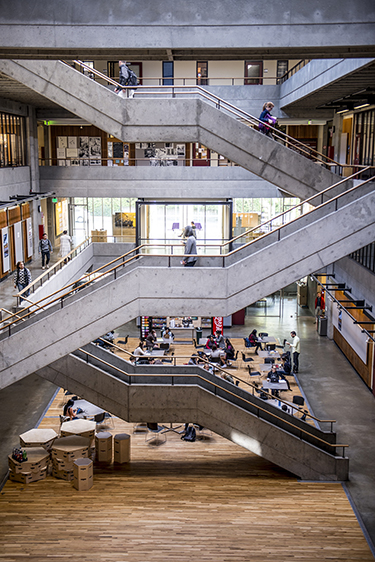|
Subscribe / Renew |
|
|
Contact Us |
|
| ► Subscribe to our Free Weekly Newsletter | |
| home | Welcome, sign in or click here to subscribe. | login |
Real Estate
| |
 |
February 23, 2017
Runstad Center molds tomorrow’s real estate leaders
Runstad Center for Real Estate Studies

Orser
|
I recently had the honor to serve as director at the Runstad Center for Real Estate Studies at the University of Washington. Having graduated in 1982 from UW with a master’s degree in urban planning, I came back, full circle, to the very building I left years ago after a fulfilling career in real estate.
With the passing of 35 years, perspectives can definitely change. Certainly the view as director is through a different lens than the aspiring student.
The UW has a deep and rich history in this market. More than 150 years ago, the university was the literal center of the city, located on land we now refer to as the Metropolitan Tract: a rectangle formed by the intersections of Seneca Street, Third Avenue, Union Street and Sixth Avenue. Today, while it occupies an entirely new location just north of downtown, the UW in some respects is still at the center of the city’s pulse, with its leaders taking an active role in issues affecting all types of local stakeholders.
For instance, there are more than 140 talented UW professors whose research touches the urban fabric in some meaningful way. These academicians are from the College of Built Environments, as well as schools of Law, Public Policy, Social Work, Medicine and every other area of learning on the internationally renowned campus. They’ve recently created a group called Urban at UW, working on a host of issues, including one of great importance to many of us: homelessness.
It’s a messy and sometimes controversial topic, to be sure, and there are no easy answers. At UW, the homeless issue brings together a host of higher-education leadership to help generate meaningful solutions through collaboration and research.
Any time an institution of this size can assemble this many professionals from different academic disciplines, and cultural and political backgrounds, it should be considered an example of significant achievement.
Runstad Center
The Runstad Center resides within the College of Built Environments, and benefits daily from the aura of learning and innovation that the university creates. It’s a relationship that helps the center play an important role in the growth and prosperity of the Seattle community.
The industry benefits from the center’s development of tomorrow’s real estate leaders by offering students an interdisciplinary and comprehensive real estate education that values sustainability. The cultivation of new talent will become even more important to local companies as Seattle’s market continues to expand.
Seattle is the ideal location for a school like Runstad. Currently, the city ranks near the top of several national lists for the number of cranes in operation, demand for new-construction permits, appreciation of home prices, overall job growth, and wage increases, to name just a few.
These are positive economic benchmarks, but rapid change also creates stress in our community at large. Seattle is also home to ever-increasing traffic congestion, lack of affordable housing, economic disparity, displacement, and other ill effects of urban growth.
These are challenges current and future leaders must address.
As our industry ages, new leaders are always emerging to help take us places unforeseen. But we will need more leaders that appreciate our area’s history, our community values, and the aspirations of established and new businesses that will need office space. Their employees will seek affordable, centrally located housing and access to goods and services and public transit.
It’s community succession planning, in a way. That’s where the UW and the Runstad Center play active roles — we are teaching, coaching and molding the next generation of leaders that can engage our values and develop solutions that we simply cannot conceive of today.
Two forms of education
In my time as director, I’ve discovered that a real estate education comes in two forms: academic and applied. There’s no better place to learn real estate fundamentals than in an interdisciplinary environment, at the College of Built Environments, simply because it includes all the critical disciplines of a real estate career: construction, design and planning. Relative to other national, and even international, programs, the Runstad education is unique in this specific way.
The most critical element of a real estate education, however, is the applied side of the curriculum. Indeed, it offers the highest potential to generate leaders who will make an impact in the marketplace. Internships, mentorships, practicing professionals teaching as adjunct professors, and our fellows program are just some of the ways Runstad executes on that promise. Our students meet frequently with seasoned local real estate executives to discuss market dynamics — invaluable access that helps to ready them for the working world.
Demand for Runstad Center leaders is well beyond the supply, but we have taken extraordinary steps to build on our successes.
Simon Stevenson, our new director, is a finance academician from the University of Reading in England. He brings deep experience in finance, as well as an international perspective from the world’s leading financial hub.
James Young, our new associate director for research, began his tenure in February. Young comes to us from the University of Auckland, and has 20 years of industry experience in both the U.S. and Europe, with a focus on housing markets.
With the recent extraordinary gift from the Jacobi family and Windermere Real Estate, we will soon hire three new professors and begin a minor in real estate. And, within a year, the Runstad Center will have one of the largest dedicated real estate faculties in the country.
Tackling diversity
Despite all these accomplishments, our local real estate industry, as well as the Runstad Center, can do much better in one important area: diversity.
We’re making progress, as half this year’s class is comprised of women and 40 percent of students are from outside the U.S. However, our Latino and African-American populations should have a bigger role in the next generation of Seattle’s development, and it’s something we’re all targeting for improvement.
We are developing programs to reach Seattle-area students of color, in hopes of introducing them to the tools of the trade well before they begin to dream of how they can have an impact. They should have an appreciation of the built environment, how it can shape their own community and which of the many disciplines at the College of Built Environments can give them the best tools.
While I didn’t get a degree from the Runstad Center, my time in this inspirational place has taught me a few important lessons.
First, despite its size and considerable local profile, we often take the UW for granted. It’s not just an economic engine; the UW is also a solutions engine. It is a place to learn, lead and transform in ways that go well beyond our current understanding.
Second, I have come to more fully appreciate that education is only partly provided through the academic curriculum — a true education is informed by the practical realities of a marketplace. That principle works the other way as well; innovation is actually enabled by a mastery of the academic fundamentals.
Lastly, I was not wrong when I chided my own children, as my father chided me, that “your homework is never done,” learning is a lifelong endeavor, and it doesn’t end on graduation day.
What I see in the next generation of leaders is a full appreciation of the potential their time as a student at the Runstad Center has bestowed upon them and the responsibility to change the world that comes with it. I am thankful we have such opportunities at the University of Washington and hopeful about our collective future.
Peter Orser is outgoing director at the Runstad Center for Real Estate Studies at the University of Washington. He is the former president and CEO at Weyerhaeuser Real Estate Co., and led Quadrant Homes for more than 25 years.
Other Stories:
- Retailers, shippers push demand for industrial space
- Seattle area office market riding a strong tailwind
- Endless job growth fuels robust multifamily market
- Mid-rise apartments go upscale to take on high-rises
- Survey: Vulcan Inc.
- Survey: Bosa Development
- Seattle real estate market faces 3 big risks
- IRG keeps the polish on former Weyerhaeuser gem
- Transferable development rights: Where’s the incentive?
- Preserving a neighborhood’s roots with thoughtful design
- Sleepless nights for hotel investing?
- Survey: Beacon Development Group
- Survey: Wright Runstad and Co.
- Survey: Seattle Housing Authority
- Survey: Skanska USA Commercial Development



